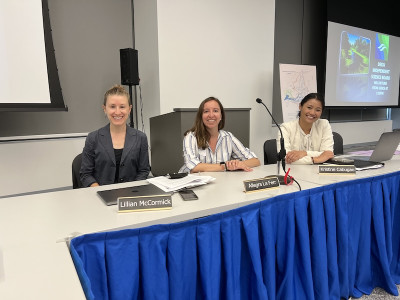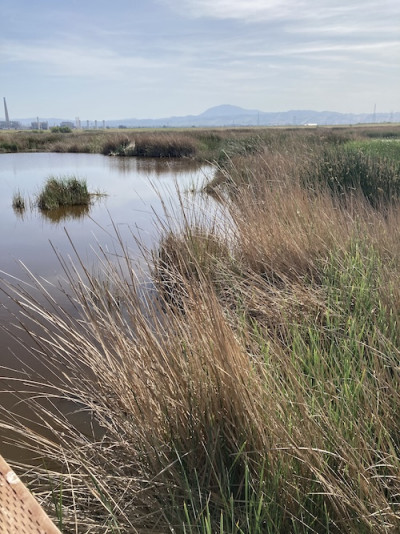The Sacramento-San Joaquin Delta is the reverse of a classic river delta: Instead of branching out close to the sea, it starts narrow at the coast, then widens further inland. Spanning more than 1,100 square miles in Central California, including 60 reclaimed islands, protected by 1,330 miles of levees, the Delta provides habitats for more than 750 plant and wildlife species in ecosystems ranging from tidal channels to marshes to riverside forests and farmland.
But for Lillian McCormick, a postdoctoral researcher with the Delta Independent Science Board (Delta ISB), the most fascinating aspect wasn't just the natural environment. What thrilled McCormick was the intricate web of agencies and organizations — state, federal and local, government and non-governmental — that collaboratively manage the California Delta. This political structure “was a very different kind of ecosystem that I learned about,” says McCormick, who finished up her postdoc earlier this year. The postdoc position was co-organized by California Sea Grant and the Delta Stewardship Council.
She hadn’t known what to expect when she started the position. “It’s a unique postdoc and really, really interesting,” says McCormick, who earned her bachelor's degree in marine science from Eckerd College in St. Petersburg, Florida, before completing her Ph.D. in biological oceanography at Scripps Institution of Oceanography at the University of California, San Diego.

Tackling the Delta's Uncertain Future
While most postdoc positions focus exclusively on academic research, McCormick helped the Delta ISB with its scientific oversight activities. The board, which supports the Delta Stewardship Council, a California state agency, consists of about a dozen researchers who combine wide-ranging knowledge of freshwater and marine ecosystems. The multidisciplinary team conducts large-scale reviews of management practices in the Delta. Typically done over one to three years, the reviews provide an outside perspective that federal and state agencies, non-profits, universities, water agencies and the broader science and management community in the Delta can use as a reference.
McCormick worked, for example, on a review examining how managers prepare for events that could harm the Delta. The region not only provides habitats and migration grounds for many of the state's commercially important fish but also drinking water for two out of three Californians.
McCormick was particularly interested to learn how planners prepared for potential disasters that are deeply uncertain. In other words: Events that might have far-reaching consequences for the Delta but that even scientists struggle to fully comprehend or predict. "We looked at how agencies and groups considered scenarios like a hundred-year flood or compound events, such as a series of atmospheric rivers followed by an earthquake," said McCormick. "These events could certainly happen, we just don't know how to predict them. But the state still needs to plan for them and consider what they would mean for our water supply, human health, and environment.”
After reading through published planning scenarios and interviewing regional planners, McCormick and another postdoc discovered that few planners tackled such big unknowns. This became a topic at a series of public seminars the Delta ISB set up. "The sessions explored methods that can help the data science and management community better prepare for events with deep uncertainty,” says McCormick.
From Food Webs to Employment

She also helped lead a review of the impact of upper trophic levels (top predators in the food web) on the Sacramento-San Joaquin Delta ecosystem — everything from predatory fish to birds to sea lions and human fishers. For this, McCormick analyzed existing research, spearheaded discussions with experts, and organized a two-day workshop, which drew over 100 participants. “While there's already a wealth of research on food webs in the Delta, this helped us understand what the scientific community still wants to learn about the topic,” says McCormick.
Having been drawn to working at a state or federal agency level, she found the experience as a Delta ISB postdoc invaluable. "I got exposure to a new community of scientists and policymakers and learned about the connections between all the agencies," says McCormick, who credits California Sea Grant, the Delta Stewardship Council, and the Delta ISB for helping her land her current job as a fish biologist at the U.S. Bureau of Reclamation.
“I applied to federal agencies before I took this postdoc and didn't even get interviews," she says. "When I applied after this postdoc, with the new skills and knowledge I had gained, I did.”
About California Sea Grant
NOAA’s California Sea Grant College Program funds marine research, education and outreach throughout California. Headquartered at Scripps Institution of Oceanography at the University of California San Diego, California Sea Grant is one of 34 Sea Grant programs in the National Oceanic and Atmospheric Administration (NOAA), U.S. Department of Commerce.